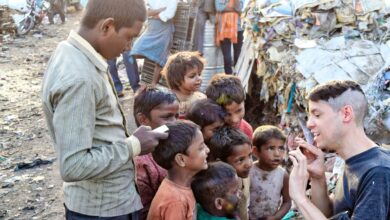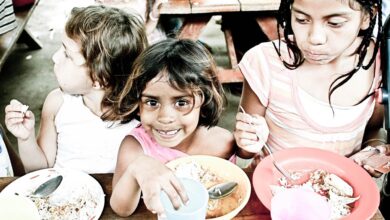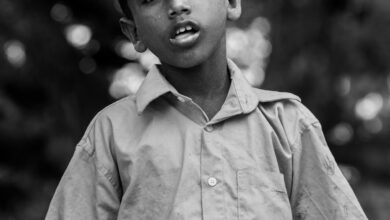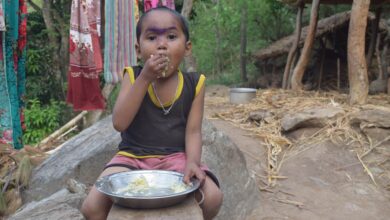Title: Hunger and Its Devastating Impact on Poor Kids
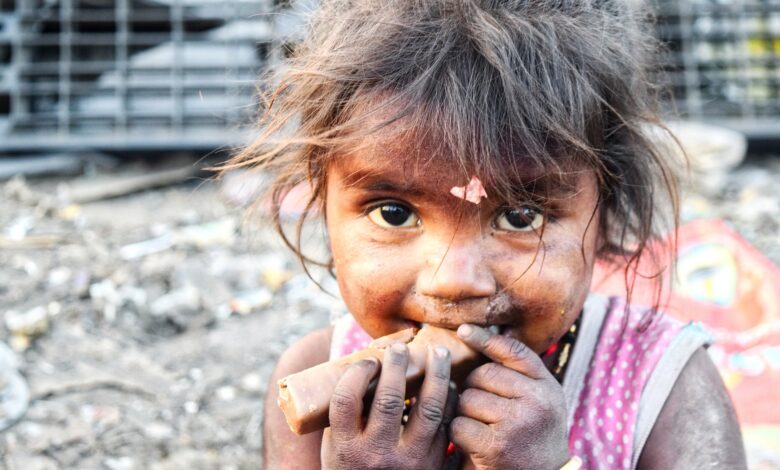
Introduction
Hunger is a pressing issue affecting millions of children around the world, particularly those living in poverty. The lack of access to nutritious food has severe consequences on the physical and mental well-being of these vulnerable young individuals. This article delves into the definition of hunger, explores its impact on poor kids, discusses its causes and consequences, highlights initiatives aimed at alleviating hunger, emphasizes the importance of proper nutrition, examines the effects of hunger on physical and mental health, explores the intersection of education and hunger, provides solutions to address hunger among poor kids, and discusses the role of government and nonprofit organizations in combating this issue.
Definition of Hunger
Hunger refers to a physiological state where an individual experiences a strong desire for food due to a lack of adequate nourishment. For poor kids, hunger becomes a daily struggle as they often lack access to sufficient and nutritious meals, leading to malnutrition and hunger-related health problems.
Impact of Hunger on Poor Kids
Hunger has a profound and detrimental impact on the lives of poor kids. It affects their physical growth, cognitive development, and overall health. Insufficient intake of essential nutrients hampers their immune system, making them more susceptible to diseases. Furthermore, hunger impairs their concentration and learning abilities, hindering their educational progress and future opportunities.
Causes of Hunger among Poor Kids
Multiple factors contribute to hunger among poor kids. Poverty, limited household income, and lack of access to affordable and nutritious food options are primary causes. Additionally, food deserts, where nutritious food is scarce, and food insecurity resulting from unstable living conditions exacerbate the problem. Unemployment, low wages, and inadequate social welfare systems further perpetuate hunger among impoverished children.
Consequences of Hunger on Poor Kids
The consequences of hunger among poor kids are far-reaching and deeply troubling. Malnutrition leads to stunted growth, weakened immune systems, and increased susceptibility to illnesses. Cognitive impairments and learning difficulties hinder their academic performance and limit their potential. The cycle of poverty continues as hungry children face challenges in breaking free from the cycle due to their compromised physical and mental well-being.
Initiatives to Alleviate Hunger
Several initiatives have been undertaken to address the issue of hunger among poor kids. Government programs, such as school meal programs and food assistance programs, aim to provide nutritious meals to children from low-income families. Nonprofit organizations, food banks, and community-driven efforts also play a vital role in distributing food and raising awareness about the issue. These initiatives work towards reducing hunger and improving the lives of impoverished children.
Importance of Proper Nutrition
Proper nutrition is crucial for the healthy development of children. A balanced diet that includes essential nutrients like proteins, carbohydrates, vitamins, and minerals is essential for growth, physical well-being, and cognitive function. Poor kids lacking access to proper nutrition face significant hurdles in their overall development and are more likely to experience long-term health issues.
Effects of Hunger on Physical Health
Hunger takes a toll on the physical health of poor kids. Malnourishment weakens their immune systems,
leaving them vulnerable to various illnesses and infections. Lack of proper nutrition can lead to stunted growth, weight loss, anemia, and vitamin deficiencies. Poor kids experiencing hunger often suffer from fatigue, weakness, and decreased energy levels, which hinders their ability to engage in daily activities and negatively impacts their overall well-being.
Effects of Hunger on Mental Health
Hunger also has a significant impact on the mental health of poor kids. Chronic hunger and malnutrition can lead to psychological distress, anxiety, and depression. The inability to focus and concentrate due to hunger affects their cognitive abilities and learning capacity, resulting in poor academic performance and lower self-esteem. These children may experience feelings of shame, embarrassment, and social isolation, further exacerbating their mental health challenges.
Education and Hunger
Hunger and education are closely intertwined. Poor kids experiencing hunger often face barriers to education. Hunger affects their ability to concentrate in school, impairs their memory retention, and diminishes their cognitive skills. Without access to proper nutrition, these children struggle to perform academically, perpetuating the cycle of poverty. Addressing hunger is essential for ensuring equal educational opportunities and breaking the cycle of poverty for future generations.
Solutions to Address Hunger among Poor Kids
To combat hunger among poor kids, a comprehensive approach is required. It involves implementing sustainable solutions that address the root causes of hunger and provide long-term support. Some key strategies include:
- Enhancing access to nutritious food: Ensuring that low-income families have access to affordable and nutritious food through initiatives such as subsidized programs, community gardens, and farmers’ markets.
- Strengthening social welfare systems: Improving social safety nets and support systems to provide financial assistance, job training, and employment opportunities for families living in poverty.
- Expanding school meal programs: Investing in and expanding school breakfast and lunch programs to ensure that all children, especially those from disadvantaged backgrounds, receive nutritious meals during the school day.
- Promoting nutrition education: Incorporating nutrition education into school curricula to teach children and their families about healthy eating habits, food preparation, and the importance of a balanced diet.
- Collaboration and advocacy: Encouraging collaboration between government agencies, nonprofit organizations, schools, and communities to coordinate efforts, share resources, and advocate for policies that address hunger and poverty.
Role of Government and Nonprofit Organizations
The role of government and nonprofit organizations is pivotal in addressing hunger among poor kids. Governments must prioritize poverty alleviation and invest in programs that provide financial assistance, healthcare, and access to nutritious food for low-income families. Nonprofit organizations play a vital role in distributing food, raising awareness, and advocating for policy changes. By working together, governments and nonprofits can create a more equitable society where every child has access to adequate nutrition and the opportunity to thrive.
Conclusion
Hunger among poor kids is a distressing reality that has far-reaching consequences on their physical health, mental well-being, and educational opportunities. It is crucial to address the root causes of hunger and implement sustainable solutions to break the cycle of poverty. By prioritizing proper nutrition, strengthening support systems, and fostering collaboration, we can create a brighter future for all children, free from the burdens of hunger and its devastating effects.
FAQs
FAQ 1: How widespread is hunger among poor kids? Hunger among poor kids is a global issue affecting millions of children worldwide. It is prevalent in both developed and developing countries, where poverty and food insecurity persist.
FAQ 2: What are the long-term effects of hunger on children? Long-term effects of hunger on children include stunted growth, impaired cognitive development, increased risk of chronic diseases, poor academic performance, and limited opportunities for future success.
Individuals can contribute to alleviating hunger among poor kids in various ways:
- Donate to food banks and nonprofit organizations: By donating money, food, or volunteering your time, you can support organizations that distribute food to families in need.
- Advocate for policy changes: Raise awareness about the issue of hunger among poor kids and advocate for policy changes that prioritize access to nutritious food and social welfare programs.
- Support community initiatives: Get involved in local community initiatives such as community gardens or food drives, which aim to provide fresh produce and essential food items to families living in poverty.
- Volunteer at schools: Offer your time and expertise to assist with school meal programs or mentorship programs that focus on providing support and guidance to children affected by hunger.
- Educate yourself and others: Learn about the causes and consequences of hunger among poor kids and share this knowledge with others. Engage in conversations and discussions to promote understanding and empathy.
Remember, even small contributions can make a significant difference in the lives of these children. Together, we can work towards a future where hunger is eliminated, and every child has access to nutritious food and the opportunity to thrive.
FAQ 4: Can hunger among poor kids be completely eradicated? While complete eradication of hunger among poor kids may be challenging, concerted efforts from governments, organizations, and individuals can significantly reduce its prevalence. Continued focus on poverty alleviation, education, and sustainable solutions can bring us closer to a world where hunger is no longer a barrier for children’s well-being and development.
FAQ 5: How does hunger among poor kids affect their future prospects? Hunger among poor kids can have long-term consequences on their future prospects. Malnutrition and compromised health hinder their educational attainment and limit their opportunities for personal and professional growth. Breaking the cycle of hunger is essential for ensuring equal opportunities and a brighter future for these children.
